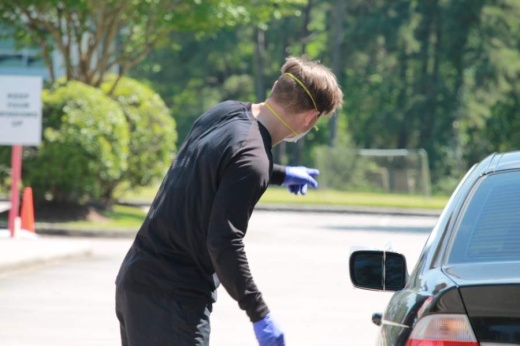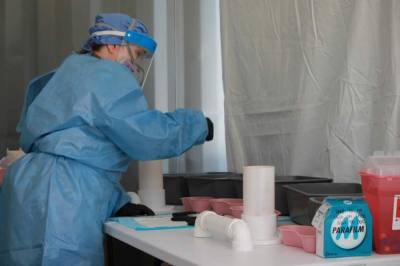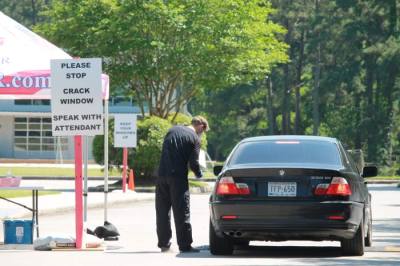Due to limited supplies and a backlog on orders of testing kits, Montgomery County has not been able to provide free coronavirus testing for those without insurance as of April 20. And officials with privately run testing sites say they do not have the funds to adequately serve the uninsured population.
Ideally, there should be a free coronavirus testing center in every quadrant of Montgomery County, said Misti Willingham, public information officer for the Montgomery County Public Health District.
But as of April 20, the closest free testing site for Montgomery County residents is in Butler Stadium in southwest Houston, which is operated by the city of Houson. In addition to the city-led site, Harris County runs two county-run drive-thru testing sites, which are free to anyone in the general public experiencing symptoms.
As of April 16, Willingham said MCPHD was aware of 25 testing sites in Montgomery County, but none of these are city or county operated.
Due to limited resources, Montgomery County—which has a population of 607,391 compared to Harris County's 4.71 million, according to July 2019 estimates by the U.S. Census Bureau—has been unable to secure enough testing kits to launch a free testing site. As of April 20, MCPHD is not testing for coronavirus, Willingham said.
“We wouldn’t want to implement mass-scale testing until we are sure we have the supply to meet the demand,” she said.
Testing kit backlog
On the week of March 8 and prior to the opening of Butler Stadium as a testing site, MCPHD entered a request to order emergency supplies from the state for 1,000 COVID-19 test kits—and received six, according to an April 14 MCPHD news release.
The Montgomery County Office of Homeland Security and Emergency Management also requested COVID-19 test kits and was told the state would consider sending kits in August, according to the news release.
Several major hospital systems in the Greater Houston area—St. Luke’s, Memorial Hermann, Houston Methodist and Texas Children’s Hospital—then attempted to pool resources and set up free testing sites in Houston and surrounding counties, Willingham said. But these entities also never received enough test kit resources to provide test sites in areas outside Houston, she said.
The Southeast Texas Regional Advisory Council did receive some test kit resources from the state and, along with the larger Houston-area hospital systems, set up the free testing center located at Butler Stadium, Wilingham said.
Since the April 14 news release, Willingham said MCPHD is in open dialogue with the state and is working to obtain more test supplies. Chris Van Deusen, director of media relations for the Texas Department of State Health Services, said one challenge for the state has been obtaining testing swabs.
“We had some on hand in our labs, so we were able to share those out, but it was a limited supply,” he said. “Obviously when you’re talking about across the entire state of Texas, we tried to share those out as fairly as possible, but nobody in that situation is going to get as much as they asked for.”
Van Deusen said April 20 that the department received 10,000 nasopharyngeal swabs the week prior and is working to figure out a distribution plan.
“I think that’s really going to be a big help in filling some more of the requests that we’ve gotten from local health departments or local governments that want to really step up the testing in their areas,” he said. “And then we’re expecting additional shipments in the future.”
In the meantime, the county has had its hands tied on opening testing sites without guarantee that supplies and manpower would be delivered. At the April 2 The Woodlands Township board meeting, County Judge Mark Keough said he had been in discussions with Conroe ISD to set up a testing station at Woodforest Stadium but had to scrap plans due to lack of resources.
“We just didn't have what we needed to in order to put it in place at that time,” he said. “Harris County has got the regional element to it that people can go, but hopefully very quickly we’ll get those other tests.”
Community Impact Newspaper has reached out to the county to ask how much it has spent on testing kits.
“Even though we have paid for them, what we’re finding is that all this activity is creating such a backlog of things that even in the tests that we have ordered, we’re still waiting and they get put off,” Keough said. “We’re hearing that they get put off again, and they get put off again.”
Keough’s Chief of Staff Jason Millsaps said at an April 8 emergency county commissioners court meeting that he does not anticipate any additional tests being purchased at this time because of the back order.
Other testing sites
Counties can partner with private providers to open free testing sites. Harris County, for instance, opened two new coronavirus testing sites at Walgreens locations in Houston and Pasadena on April 17 that are free of cost. As of April 20, Montgomery County does not have any such partnerships, but Willingham said the county is working to expand free testing.
However, several private entities have opened testing sites in the county. For example, America’s ER opened the county’s first drive-thru testing site at Stonebridge Church in The Woodlands on April 4, and Lone Star Clinic Family Clinic opened its drive-up testing clinic April 13.
The Lone Star Family Clinic, a nonprofit that normally serves uninsured or low-income populations, originally began testing only first responders, individuals at high risk and symptomatic individuals who had exposure to the virus. Now, the clinic is open to anyone symptomatic and tests about 500 individuals per week, CEO Karen Harwell said.
“We want to do as much as possible, but there are of course budget constraints being a nonprofit,” Harwell said. “We would not ever have the ability to just publicly test everyone who lives in the county because we’re out of pocket for all of that processing.”
To get tested, patients must go through a registration process and screening. The next day, they can drive to the clinic, and someone will swab them in the car, Harwell said. They should receive results within 48 hours.
The downside is residents have to become patients to comply with the clinic’s federal guidelines. This means the clinic will either bill a patient’s insurance, charge $75 in cash for an existing patient, charge $100 for a new one or about $25 for those in need of financial assistance. There is also the question of whether there are enough resources.
“We’re prepared for numbers to grow, and we have the staff to test more people. It’s just a matter of how many referrals we’re gonna start getting,” Harwell said. “And if our volume does ramp up, can our lab keep up with the demand?”
Officials with America’s ER said because of the speed that the virus spread, the funding, infrastructure and general bureaucracy were not in place to prepare for the situation. This prevented money from flowing quickly to allow for free and low-income testing, said Dr. Mark Feanny, president, CEO and owner of America’s ER.
“I think people were caught off guard,” Feanny said.
America’s ER—which is testing between 130-140 people per day at its Stonebridge Church location—receives no federal, state or local financial support. The site charges $150 per person to cover the cost for evaluation and screening, test collection, required supplies, staffing expenses and lab fees, and can be billed through insurance. Those without insurance will have to foot the bill.
“Until we receive subsidies of some form from any government agency, it will be challenging for us to open this test to the ... unemployed public,” Feanny said. “Somebody has to pay the check. And right now, we’re the one’s holding the bill.”
Ben Thompson and Emma Whalen contributed to this story.






